The HTC One (M8) Review
by Anand Lal Shimpi & Joshua Ho on March 26, 2014 7:00 PM EST- Posted in
- Smartphones
- HTC
- Mobile
- HTC One
Subtle Cheating: New Benchmark Optimizations
We’ve been tracking the state of benchmark optimizations among Android OEMs for a while now. It wasn’t too long ago that we published a piece calling out nearly all Android OEMs for optimizing for benchmarks. The optimizations are pretty crude. Upon detecting a whitelisted benchmark by APK identifier alone, most OEMs would enable a performance mode that would:
1) Plug in all CPU cores
2) Run all cores at max frequency
3) Raise thermal limits to eliminate/reduce throttling
Defeating the optimization was just as simple: thorough renaming of the benchmark and all internal application IDs. For the past several months we’ve been working with benchmark, silicon and handset vendors to curb the behavior. Although we found the optimizations to have minimal impact on our test results, it’s still a messy practice that isn’t worth doing.
We’ve seen early (encouraging) indications that some vendors have reconsidered their position on benchmark optimizations. Unfortunately HTC isn’t quite there yet.
The M8’s Android 4.4.2 build includes a new, more subtle form of benchmark optimization that we hadn’t seen in previous devices. Benchmarks are still detected according to their application identifier, but instead of hot plugging in all CPU cores and driving them to max frequencies, everything appears to be normal at launch.
Here’s the state of the CPU cores after launching the Play Store version of any optimized benchmark:
Everything looks just fine. But look at what happens if we monitor CPU frequency over time on the Play Store and a special renamed version of 3DMark:
Average CPU frequency is about 15% higher while running the Play Store version of 3DMark. I still need to run some thermal analysis on the device but I don’t think HTC is raising thermal limits. Instead what appears to be happening is HTC is simply more aggressively tuning the governor response to performance demands, allowing for higher frequencies. Note that the frequency response latency is now so low that I couldn't even grab the 300MHz screenshot above in the Play Store version of 3DMark. As soon as the device detected a button press it would ramp up to 1.7GHz.
The impact on performance goes hand in hand with the increase in average clock speed. I measured performance during 3DMark’s Physics test (which is CPU bound). The difference was about 15%.
I also tracked GPU clock speed over time. Thankfully the optimization seems limited to CPU frequencies alone:
The list of optimization targets has also expanded since we last looked at HTC. The latest versions of GFXBench, BaseMark X and BaseMark OS II are now included in the benchmark whitelist.
HTC made one small concession - it’s allowing users the ability to run their device in this high performance mode at all times. Under developer tools (tap on the build number 5 times in Settings > About > Software information > More), you’ll find an option to enable high performance CPU mode. Checking that box will put your device in the same mode that’s enabled when a whitelisted benchmark is detected.
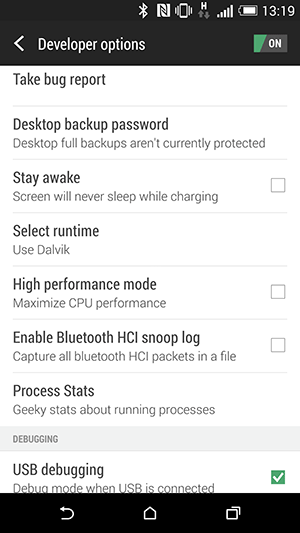 |
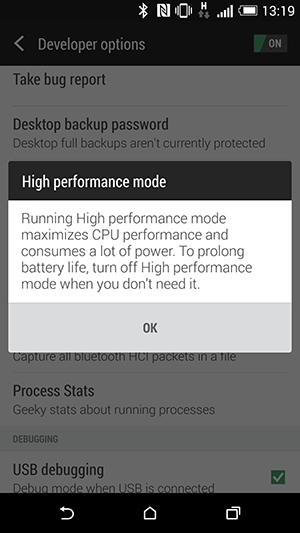 |
I do appreciate that HTC is exposing the optimization control, the only thing missing is the ability to toggle the benchmark optimization off (not to mention that I’d prefer if it was disabled to begin with). I fear that HTC’s justification in all of this is that everyone else is doing it so why opt out. The reality seems to be trending the other direction however. We’ll have to see what Samsung does with the Galaxy S 5, but I have a feeling that HTC is going to end up on the wrong side of history with this move. All of our benchmarks are already immune to the optimization, so it’s really a matter of sacrificing integrity for no real gain. There’s nothing more to say other than I’m disappointed.


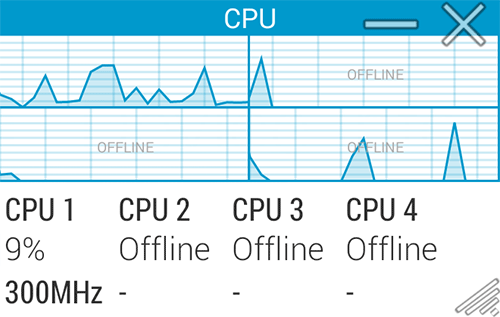
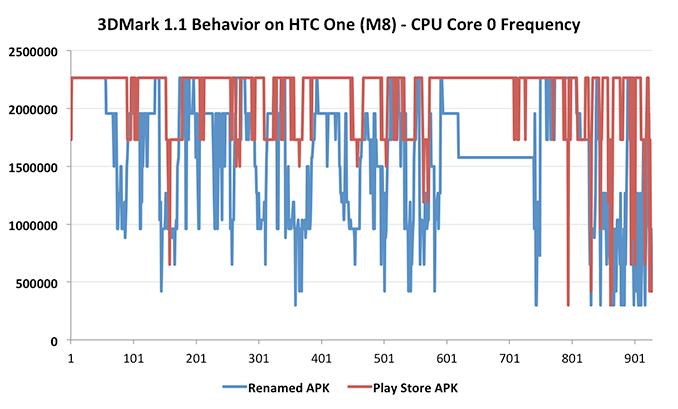
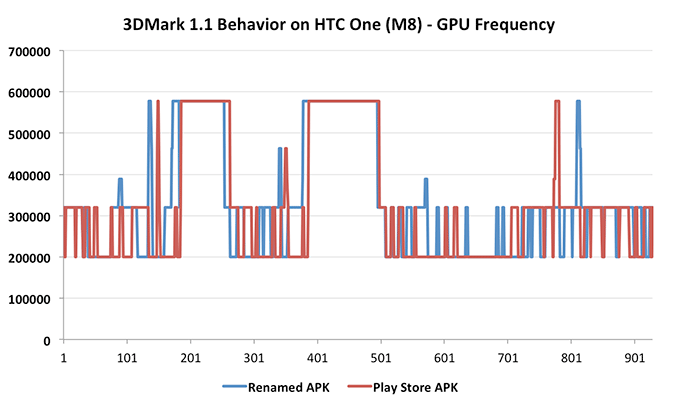








222 Comments
View All Comments
secretmanofagent - Wednesday, March 26, 2014 - link
Does the new Sense UI allow you to see emails on the lock screen? They took that away from the One Mini in the 4.3 update. They also moved the widgets to a painful swipe to the left, was hoping they fixed that too.gg555 - Wednesday, March 26, 2014 - link
No review of the noise cancellation? Sigh. I've come to count on AnandTech as the only site that takes this seriously. But it seems to be getting passed over in recent reviews.hangfirew8 - Saturday, March 29, 2014 - link
Love Love Love the noise cancellation on my M7. Thank you for reminding me of that.Yes we need to keep on top of that.
varad - Wednesday, March 26, 2014 - link
Neat review but seriously, where is Brian Klug?yelped - Wednesday, March 26, 2014 - link
Great question! Seriously, this review wouldn't have been missing an analysis on the audio quality, and the network connectivity (WiFi, Bluetooth..). Also, can you explain what the Sprint version is using instead of the QFE1000?Thanks!
jasonelmore - Wednesday, March 26, 2014 - link
something is definitely up. Anand staff have been dodging questions about the whereabouts of Brian Klug for several days, so me thinks Anand and Brian had some kind of "falling out". Whether it was over Pay, or internal beef, it definitely makes you wonder. For example, he did not attend Nvidia's conference, nor was he part of a Major Android flagship review.Blairh - Thursday, March 27, 2014 - link
Anand admitted in private to Brian that he loves SD cards in phones and that was that.yelped - Thursday, March 27, 2014 - link
Lol. Though I am wondering what's going on.. Also, any word why Sprint has different front ends and why?asaini007 - Thursday, March 27, 2014 - link
HahaAnand Lal Shimpi - Thursday, March 27, 2014 - link
There's no falling out, I just had dinner with Brian :) Can't talk about much more for now, sorry :)Take care,
Anand